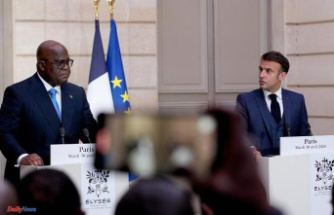Around 20,000 people demonstrated against the first reading vote of the bill on “foreign influence” in front of the Georgian Parliament in Tbilisi on the evening of Wednesday April 17. In the evening, demonstrators blocked the main artery of the capital in the face of hundreds of riot police, before marching towards the prime minister's offices to demand that he come to meet them, noted an Agence France journalist -Press. Rallies also took place in several other cities across the country, including the second, Batumi, according to the Interpress news agency.
At the origin of massive rallies since the beginning of the week, the bill took a major legislative step during the night from Tuesday to Wednesday by receiving the approval at first reading of the deputies of the Georgian Dream party, in power, during a vote boycotted by the opposition. The text, compared to a repressive Russian law on “foreign agents”, is seen as an obstacle to the European ambitions of this Caucasian country.
Two other readings should follow, a process which could take weeks, especially since the Georgian president, Salomé Zourabichvili, pro-European and in conflict with the government, could then veto. The deputies close to power, however, have a sufficient majority to overcome it.
“A step towards Russia”
According to its detractors, this legislation is repressive and could threaten the rapprochement of Georgia, a former Soviet republic, with the European Union. The text is compared to Russian legislation on “foreign agents” used by the Kremlin since 2014 to persecute dissident voices, NGOs and independent media.
“It’s a sad day for Georgia because our government has taken another step towards Russia and away from Europe,” said protester Makvala Naskidashvili. “But I am also happy to see such unity among the youth,” added the 88-year-old woman. These young people “are proud Europeans and will not let anyone spoil their European dream. »
On Monday and Tuesday, other protests were organized. Riot police chased some protesters through the streets around Parliament, brutalizing them or arresting some. Georgian media assured that their journalists had also been mishandled by the police.
If the bill passes, organizations that receive more than 20% of their funding from abroad will be required to register as “organizations pursuing the interests of a foreign power,” or face fines. .
The European Union (EU), which granted Georgia candidate status in December, requested the abandonment of the text, believing that it goes against the reform program that this country must undertake to progress on the path to membership.
The head of EU diplomacy, Josep Borrell, and the European Commissioner for Enlargement, Oliver Varhelyi, called Wednesday's vote “very worrying”. “A final adoption of this legislation would have negative consequences” regarding Georgia’s European ambitions, they said, considering that such a law was “not aligned” with EU values. Washington has expressed similar concerns.
The government pleads for “transparency”
The Georgian government assures that the text only aims for more “transparency” in the financing of organizations. Prime Minister Irakli Kobakhidze, who initiated the bill, accused some civil society groups of trying to involve Georgia in the war in Ukraine and of wanting to start a revolution. “Forward, with dignity, towards Europe! “, he said, while ensuring that Western leaders criticize this text without putting forward any arguments.
Despite hostile statements to the West, Irakli Kobakhidze said that membership in NATO and the European Union would be his priority. Legislative elections, seen as a test, are planned in the country in October.
For her part, President Zurabichvili considered that the measure went against “the will of the population”. “This is a direct provocation, a Russian strategy of destabilization,” she said.
On Monday, deputies from the government and the opposition came to blows during an exchange on the text, causing a fight in the chamber. A first version of this bill was abandoned in March 2023 after massive demonstrations which were dispersed by the police.












